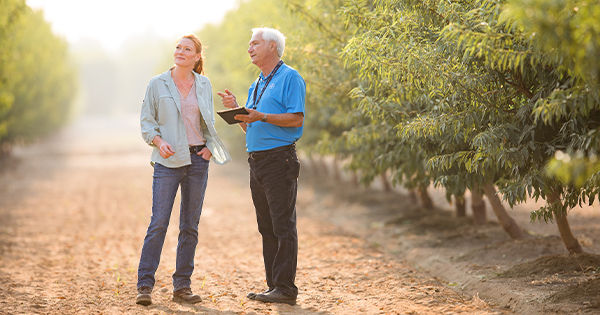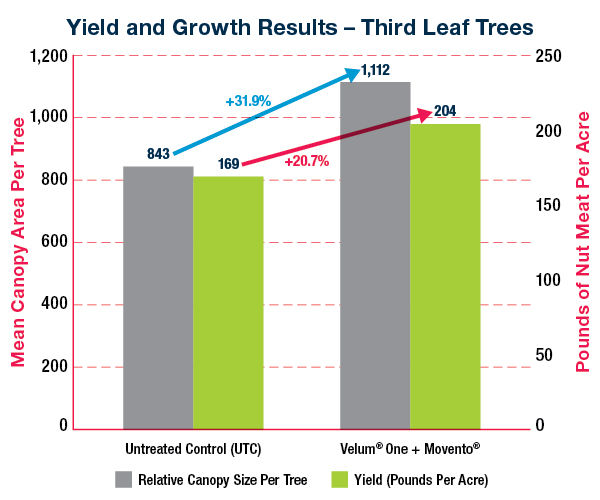Unseen Dangers: Nematode Pressures on Young Almond Trees
January 20, 2021

Almond growers along the west coast in California aim to set up young trees for success. Establishing a strong plant foundation helps increase the chances of higher yields once the trees mature, and each year following. While Pest Control Advisers (PCAs) in the region are aware of the threat, almond growers may or may not know the long-lasting impact nematodes have on young trees.
As almond demand steadily increases year over year, young almond trees make up a significant portion of acreage. Parasitic nematodes can re-infest soils within 2–3 years after fumigation, which can affect young trees while they are still considered nonbearing (until the fourth growing season). During the nonbearing stages of almond tree maturity, the major period of root growth occurs, and the basic framework of the tree is developed. These years are critical to the future well-being and productivity of the crop.
Nematode Types, Signs and Impacts on Almond Tree Health
Almond growers should be concerned about three main parasitic species of nematodes: root-knot, lesion and ring. These nematodes are especially detrimental to young almond tree root systems, making it difficult for the plant to uptake water and nutrients and survive.
Over the years, resistance to root-knot nematodes has been incorporated into many almond and peach rootstocks, but it is important to note that there is no current genetic resistance for ring or lesion nematodes. It is also important to remember that roots can live and host devastating nematodes for several years after a mature tree has been removed. Therefore, root removal, at the appropriate depth, may help reduce nematode populations, but not entirely.1
Growers can identify several signs of nematode infestation, which can include lack of vigor, small leaves, dieback of twigs and a sparse root system, particularly the lack of small feeder roots. In situations where tree growth has been visibly impaired by the second year, the affected trees may never overcome nematode problems. Stunted trees can occur within irregular, circular-shaped areas across the orchard.2
Here are some additional articles that dive deeper into the impact of nematodes and best practices for management:
Why Protect Young Trees Before They Are Fruit Bearing?
Growers should not rely solely on fumigation efforts within the first three years, as nematode populations have been known to re-infest between years 2–3. To build strong root development and enable almond trees to have excellent plant health and high yields year over year, protecting them between years 4–7 is crucial to the plant’s productivity.
Multiple studies conducted by the University of California Cooperative Extension (UCCE) and the United States Department of Agriculture (USDA) found that even with fumigation, nematodes were detected within two years of plantings, with consistent detection among all rootstocks within four years. These findings emphasize that long-term management of these pests and stresses, not just soil fumigation, is crucial to success.3
What Solutions Should Growers Consider?
Setting up young almond trees for success means getting them well-established to obtain higher yields once they have reached maturity, and for the many years to come after that. Young almond trees are vulnerable to nematode infestations, and the threat continues to have lasting impacts on roots, plant health and productivity as they mature and go untreated.
The goal is efficient and effective treatment to protect young roots and increase yield and quality. Studies conducted in 2017 by the UCCE demonstrated that young almond trees treated with a combination of Velum® One and Movento® outgrew untreated populations in 2017.4
Growers should talk to their PCA about the solutions available to them, such as Velum® One nematicide/fungicide and Movento® insecticide, for in-season nematode management for young almond trees. And for the sake of their operations and profits.

Trial IP17USA HM5 UXJ2. Collaboration between David Doll, Univ. of California (Cooperative Extension, Merced County) and Bayer Crop Sciences. 2017. Velum One injected (single line drip) at 6.5 oz/acre at spring and summer timings, Movento spring and fall application 9 oz/A. Variety Sonora.
Related Content
Work Cited
1 Doll, D. “Nematodes and Tree Growth.” The Almond Doctor, 31 Dec. 2014, thealmonddoctor.com/2009/08/24/nematodes-and-tree-growth/.
2 Connell, J. Crop Profile for Almonds in California. 26 Jan. 1999, ipmdata.ipmcenters.org/documents/cropprofiles/CAalmonds.pdf
3 Doll, David, et al. “Seventh Year Evaluation of 13 Almond Rootstocks in a Sandy Location With Nematodes.” UCCE, 2017, rd.almondboard.com/files/Seventh Year Evaluation of 13 Almond Rootstocks in Sandy Locations with Nematodes.pdf#search=nematode fumigation.
4 Doll, David, et al. Almond Fumigant Studies: Continued Research on Methyl Bromide Alternatives, UCCE , 2017, rd.almondboard.com/files/Almond Fumigant Studies_ Continued Research on Methyl Bromide Alternatives.pdf#search=nematode fumigation.
ALWAYS READ AND FOLLOW PESTICIDE LABEL DIRECTIONS. Performance may vary, from location to location and from year to year, as local growing, soil and weather conditions may vary. Growers should evaluate data from multiple locations and years whenever possible and should consider the impacts of these conditions on the grower’s fields.
Not all products are registered in all states and may be subject to use restrictions. The distribution, sale, or use of an unregistered pesticide is a violation of federal and/or state law and is strictly prohibited. Check with your local dealer or representative for the product registration status in your state. Bayer, Bayer Cross, Movento® and Velum® are registered trademarks of Bayer Group. For additional product information call toll-free 1-866-99-BAYER (1-866-992-2937) or visit our website at www.BayerCropScience.us. Bayer CropScience LP, 800 North Lindbergh Boulevard, St. Louis, MO 63167. ©2020 Bayer Group. All rights reserved.